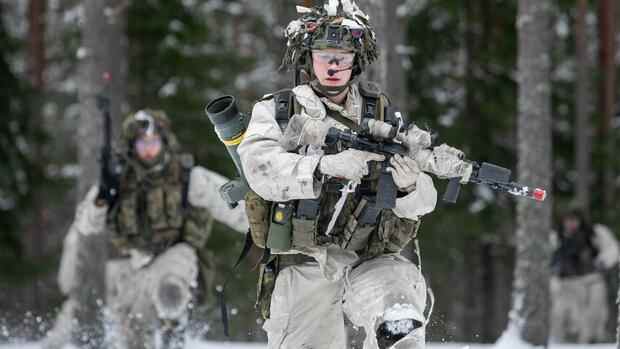The exercises are mainly held on the borders with Poland, Lithuania and Ukraine. At the same time, the Russian troop deployment along the Ukrainian border continues. Russia has concentrated around 130,000 soldiers there and has significantly increased its presence in the Black Sea. Fears of a Russian invasion of Ukraine are growing.
Especially in the Baltic countries, memories of the Soviet occupation are revived. After independence from the Soviet Union in 1991 and accession to the European Union and NATO, the fear receded. But now she is back, at least with politicians.
For weeks, the heads of government and state of Estonia, Latvia and Lithuania have been calling on their alliance partners to take tougher action against Russia. They reject the Nord Stream 2 gas pipeline in unison.
Top jobs of the day
Find the best jobs now and
be notified by email.
They wanted to make that clear again on Thursday evening in Berlin. Estonian Prime Minister Kaja Kallas, her Latvian counterpart Krisjanis Karins and Lithuanian President Gitanas Nauseda had arranged to meet Federal Chancellor Olaf Scholz.
“We consider it very important to help Ukraine in any way we can.”
(Photo: dpa)
Prior to the meeting, Estonian Prime Minister Kallas had spoken out in favor of arms deliveries to Ukraine. “It is up to each country what kind of help it wants to offer Ukraine,” she renewed her request to the German Press Agency. “We consider it very important to help Ukraine in any way we can.”
Your country wants to supply arms and ammunition to Ukraine. This also includes nine howitzers from GDR stocks. For a delivery to the Ukraine, however, Estonia needs the consent of Germany, which had initially delivered the artillery pieces to Finland. Finland then passed them on to Estonia. Berlin is still examining the request.
Permanent stationing of NATO troops in their countries is also on the wish list of the three politicians. However, the wish is unlikely to be fulfilled, since NATO and Russia agreed in 1997 not to station NATO troops permanently in the Baltic States. That is why the multinational troops in the Baltic countries and Poland are rotated every six months.
Germany is in command of the NATO units in the Baltic States
Germany is currently leading the NATO contingent and has around 500 soldiers stationed in Lithuania, but intends to send another 350 soldiers to the country. Lithuanian President Nauseda welcomed the announcement.
Lithuania’s President next to a Danish Royal Air Force F-16 fighter jet during the welcoming ceremony for the reinforcement of the NATO air patrol mission at the Siauliai air base, some 230 kilometers east of the capital Vilnius, on January 28, 2022.
(Photo: dpa)
However, the head of state and the two heads of government would prefer a significantly larger reinforcement. With around 1,000 soldiers from Belgium, Germany, Denmark, Iceland, Luxembourg, the Netherlands, Norway and the Czech Republic in each of the three Baltic countries, an attack cannot be repelled.
In Narva, in eastern Estonia, the powerful neighbor Russia is only a stone’s throw away. Only the Narva, a small river, separates small Estonia and the vast empire of Russia. A bridge over the Narva, a small border station – that’s all.
In the “most Russian city in Europe”, as Narva is called with its almost 60,000 inhabitants, the conflict with Russia is clearly noticeable. Almost 95 percent of the residents are of Russian origin, and on the streets one hears almost exclusively Russian.
The population fears the escalation of the conflict
Although many people here have ties to relatives across the river and fear nothing more than being banned from regular visits, the vast majority of residents seem content with their situation. Hardly anyone here expects an attack by Russia.
“Russia is just bluffing, as always,” says Roman, a carpenter from Narva who now lives in Tallinn. But the growing tensions between East and West are keeping people busy. “We live peacefully here and we want it to stay that way,” says Alexander, a car dealer from Narva.
So far, many people in the Baltic countries have been relatively calm about the situation. Nevertheless, there are concerns about a further escalation. Politicians are therefore calling for a significant increase in the NATO presence in their countries.
The Lithuanian army chief Valdemaras Rupsys currently sees “neither a tactical nor an operational threat”, as he explained in Vilnius at the beginning of the week, but would welcome an increase in NATO troops.
More: “When will this madness finally end?” – The hostages of the war in Donbass. A visit to the crisis area in Ukraine.
